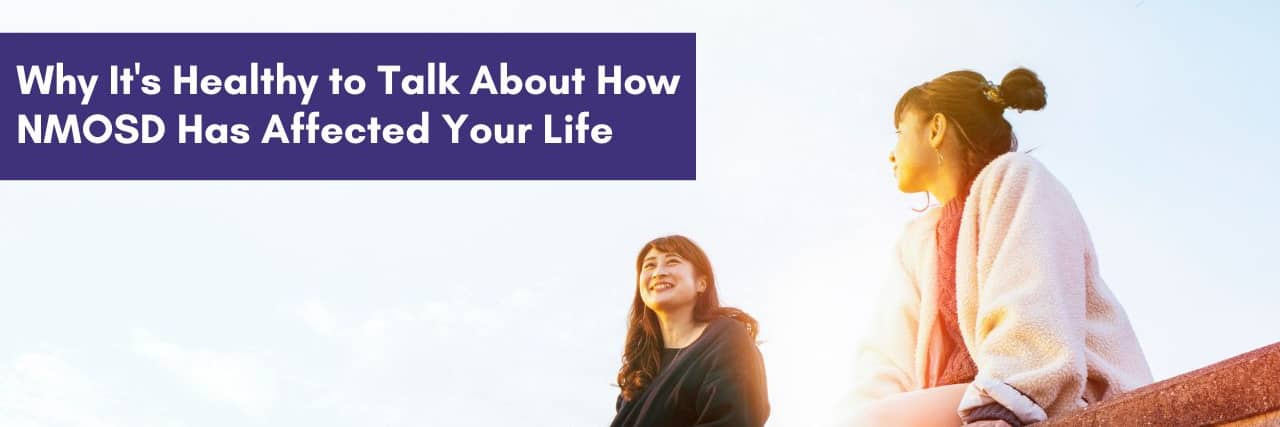Why It's Healthy to Talk About How NMOSD Has Affected Your Life
We’ve all heard the saying, “You don’t have to look sick to be sick.” Such is the case with most patients living with neuromyelitis optica spectrum disorder (NMOSD), a rare neurological disease that affects your optic nerves, spinal cord, and sometimes the brain. It’s also sometimes called Devic’s disease. Symptoms can include blindness and paralysis. This disease is life-altering.
Unless you’re using a cane or a wheelchair, NMOSD is invisible.
For people living with NMOSD, this disease lies beneath our flesh and goes against everything that should be normal in our central nervous system and it’s devastating. For some patients who’ve lost the use of their legs, they miss the early morning rush of a morning jog. Gone are the days when I could see the entirety of a beautiful sunset, or the reflection of the moon on water because I have vision loss. NMOSD affects everyone differently, but it can be a very challenging experience.
That is why it’s healthy to talk about how this disease has affected our lives. No one at the grocery store, bookstore, or coffee house would know what you’re going through. Whether it’s roommates, family, or your spouse and children, every one of them should know about your condition, not only because of the circumstances that could arise but also in case of emergencies.
Those who live with NMOSD often feel lonely, misunderstood, and not taken seriously. We take small, shaky steps day by day, but it means so much more when someone holds our hand along our journey. It’s healthy to talk to your spouse about what your pain feels like. It’s healthy to talk to your best friend about what it’s like living half-blind or visually impaired. If you bottle in every emotion, you may feel like a shell of the person you once were. Use your voice to tell the ache your heart feels every day or the fear and anxiety you live with so people get it and awareness can be made. Their thoughts could change and become more alert to your experience. A spouse may think, “My wife may go blind. How can I help her while she battles this anxiety?” A mother may think, “How can I support my daughter who is struggling physically?” Or a sister may say, “I wish I could take this from you.”
The more we speak and stop saying, “I’m fine,” the more the people around us will start to empathize with what living with NMOSD feels like. It can be challenging and filled with anxiety, but your parents, spouse, child, sister, or friends will never know that unless you say it, and speak it. Out loud.
Let your heart finally spill the tears in front of people; tears that you hide at night in bed, in the shower, or on the way to work. Let people see you vulnerable in your illness. Let close ones see your pain. Living with NMOSD means that our lives have become unpredictable. It’s important for others to know that it’s heartbreaking to us when we have to cancel any plans with friends or family.
It’s also critical that you build a support system to help you along this journey. Therapy is a wonderful option for this. Studies have shown that psychotherapy reduces disability, morbidity, and mortality; improves work functioning; and decreases psychiatric hospitalization. Personally, I’ve recognized the levels of my anxiety going blind decreasing as my therapist reminds me that I can still see from one eye and that my treatment has kept me relapse-free for three years so far. Using medication for my mental health has helped as well. NMOSD is filled with uncertainty and using medication and therapy for my mental health has been two important tools that I’ve used in my own personal journey.
Can you imagine if we truly opened up to the ones we love in our family or circle of friends, how much less weight we would bear? Not only that but, how is someone supposed to help you if they don’t know what you’re going through? It’s OK to ask for help and tell others specifically how this disease has affected you mentally, emotionally, and physically.
Though not everyone will understand what it’s like living with NMOSD, all we want is a coffee date with a listening ear, laughter to fill our homes from time to time, and grace from others to understand when we might not feel like going to that birthday party. Our spirits get filled with gratitude and our hearts feel full.
A listening ear means the world to us — as we know we’re not alone in this journey

